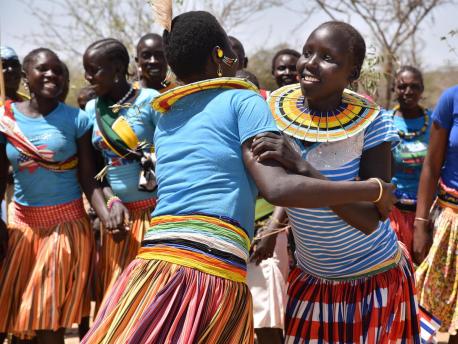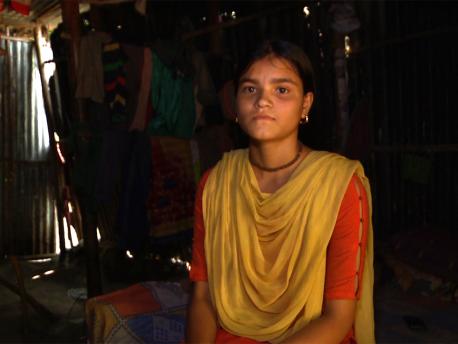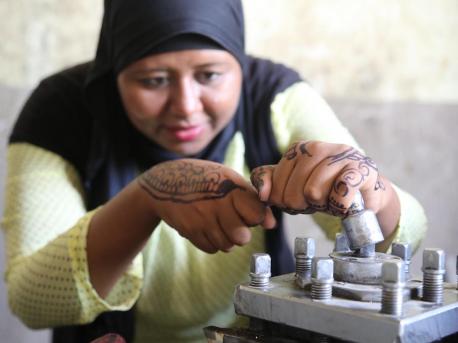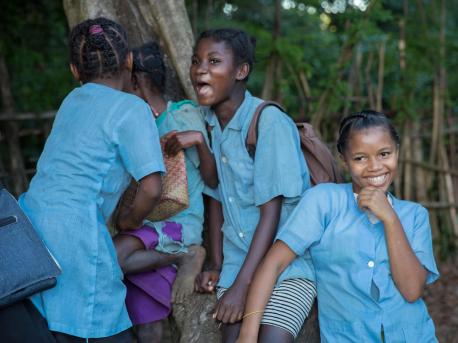
Women Are Working Together to Support Girls Worldwide
UNICEF is partnering with women's groups like Zonta International and Dining For Women to improve the lives of girls around the world.
Women have always shared their strength with one another. Walking together in the early morning to collect water, sharing in moments of laughter, caring for one another's children, and offering a comforting embrace in times of sadness. When women work together in solidarity, we have the power to shape the world around us and to make it better for future generations.
Poverty and conflict disproportionately affect women and girls
Women and girls deserve the same rights, resources, opportunities and protections as men and boys. But poverty and conflict disproportionately affect women and girls. Girls are still more likely than boys to never set foot in a classroom. An estimated 15 million girls are still married every year. And every 10 minutes, somewhere in the world, an adolescent girl dies as a result of violence. As the voices of women grow louder and stronger across the globe, women are coming together to combat these injustices, and to improve the lives of women and girls everywhere.

Although Female Genital Mutilation (FGM) is against the law in Ethiopia, the practice continues in Ethiopia's Somali region, where it is still considered a religious requirement by many. The mother of Bilen, 12, was sued by her local Bureau of Women, Children and Youth Affairs in the Bombass district after she arranged for her daughter to undergo Sunna-circumcision, a type of FGM, in 2015. © UNICEF/UNI193030/Bindra
This year's UN Commission on the Status of Women focused on gender equality and the empowerment of rural women and girls
In March 2018, thousands of women, men, girls and boys from around the world came together in New York City for the 62nd annual session of the United Nations Commission on the Status of Women (CSW). Representatives of United Nations Member States, local governments and non-governmental organizations (NGOs) met to focus on the promotion of gender equality and the empowerment of rural women and girls, sharing their concerns and identifying actions to further their rights and opportunities at national, regional and local levels.
For UNICEF USA, the CSW is an important milestone to highlight and strengthen our partnerships with organizations focused on the empowerment and well-being of women and girls. At the core of these partnerships is the commitment to support women. These organizations are working to create a world where future generations of girls do not face the same injustices, deprivations or violence, and have the opportunity for safer, healthier, more prosperous futures.

Sonia Hönig Schough (above left), President of Zonta International, visited schools in Madagascar with UNICEF USA in 2017. Zonta, a supporter of UNICEF's Let Us Learn Madagascar initiative, has partnered with UNICEF since 1972. Photo by Abela Ralaivita for UNICEF USA.
With our partners Zonta International and Dining For Women, UNICEF USA organized two important CSW panel discussions on child marriage and gender-based violence (GBV). Panelists at both events emphasized the important role civil society actors play in building awareness and action at all levels, from local communities to the national government, and stressed the need for global support to end child marriage and GBV (including sexual abuse and exploitation and female genital mutilation) among the hardest to reach. As Executive Director of UN Women Phumzile Mlambo-Ngcuka said in her closing remarks at the 62nd CSW, "We work to ensure that we leave no one behind."
Zonta International, Dining For Women and UNICEF share a common goal: a better future for girls everywhere
Zonta International's commitment to the issues facing women and girls is not new, nor is its support for UNICEF. Founded in 1919, Zonta International is a leading organization of professionals empowering women worldwide through service and advocacy. Zonta funded its first international service project more than 90 years ago, and has partnered with UNICEF since 1972. Zonta is currently supporting Let Us Learn Madagascar, a UNICEF program that focuses on creating opportunities for vulnerable and excluded girls so they can go to school in a secure and protective environment. This program is just one example of Zonta's longstanding commitment to gender equity through service, advocacy and funding.

"While Zonta is an organization of nearly 30,000 individuals from diverse backgrounds, our members come to Zonta with a common purpose to use their personal time, talents and resources to ensure that all women and girls, no matter where they live in the world, enjoy the same rights and opportunities," says Sonia Hönig Schough, President of Zonta International. "It is through our collective voice and combined efforts, however, that we can provide meaningful, hands-on service in our local communities, invest in international programs that maximize opportunities for women and girls, and advocate to put women's rights and interests at the forefront of every conversation."
When girls do better, we all do better
Dining for Women (DFW) is a global giving circle dedicated to raising awareness of the issues impacting the lives of women and girls worldwide. At monthly dinners, members discuss issues affecting vulnerable women and girls, and raise money to fight for women's empowerment and gender equity. Most recently, DFW committed to supporting UNICEF's response to gender-based violence in South Sudan and helping Syrian refugee women in Jordan through employment opportunities. "Dining for Women chapter members take their roles as global citizens seriously," says Dining for Women President Beth Ellen Holimon. "Through member education, grantmaking and advocacy, DFW builds community here in the U.S. to amplify the voices and build agency for women and girls around the world."

In households without running water, the burden of collecting safe, clean water usually falls to women and girls. Seudi, 12, lives in a village outside Harar, Ethiopia. She is often late for school because she has to wake up early in the morning and walk for over 20 minutes to fill her family's water container at the nearest borehole. "When I grow up, I will certainly have a profession that has to do with helping women," she says. © UNICEF/UNI193154/Bindra
Gender equality is not a women's issue. It's a human rights issue.
Partners like Zonta International and Dining for Women are proving that our dinner tables and local communities are ideal places to engage in conversation and take steps to tackle the issues affecting vulnerable women and girls around the world. By encouraging the engagement of women through their clubs and chapters, Zonta International and Dining For Women are paving a new path for women and girls around the world.
Through our partnerships with women's organizations, UNICEF USA is focused on creating an even stronger, more vocal global community for women and girls around the world. And we need more partners, more women and girls, men and boys, to add their voices to the movement. Join us!
Learn more about UNICEF USA's partnerships with women-led organizations.
Photo at top: Adolescent girls and women in Ausikioyon village in Uganda's Amudat District celebrate their village's public declaration against Female Genital Mutilation (FGM) before the International Day of Zero Tolerance to Female Genital Mutilation in 2014. © UNICEF/UN0120197/Nakibuuka
HOW TO HELP
There are many ways to make a difference
War, famine, poverty, natural disasters — threats to the world's children keep coming. But UNICEF won't stop working to keep children healthy and safe.
UNICEF works in over 190 countries and territories — more places than any other children's organization. UNICEF has the world's largest humanitarian warehouse and, when disaster strikes, can get supplies almost anywhere within 72 hours. Constantly innovating, always advocating for a better world for children, UNICEF works to ensure that every child can grow up healthy, educated, protected and respected.
Would you like to help give all children the opportunity to reach their full potential? There are many ways to get involved.





